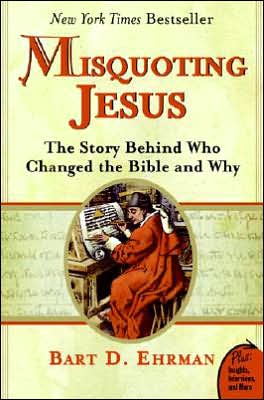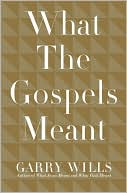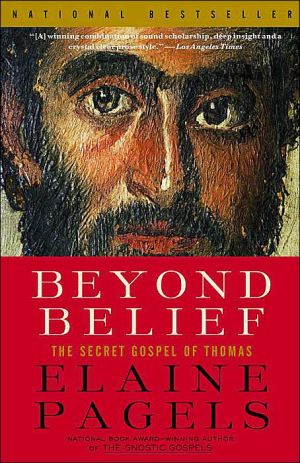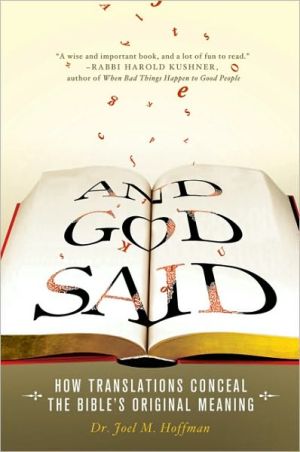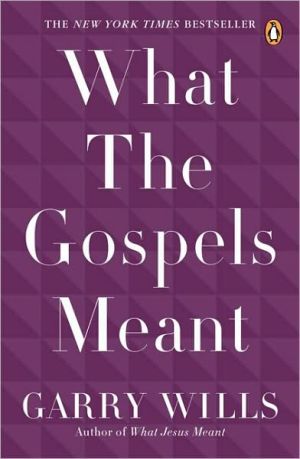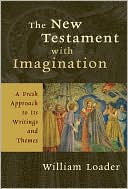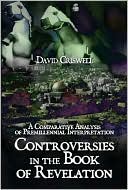Misquoting Jesus: The Story Behind Who Changed the Bible and Why
For almost 1,500 years, the New Testament manuscripts were copied by hand––and mistakes and intentional changes abound in the competing manuscript versions. Religious and biblical scholar Bart Ehrman makes the provocative case that many of our widely held beliefs concerning the divinity of Jesus, the Trinity, and the divine origins of the Bible itself are the results of both intentional and accidental alterations by scribes.\ In this compelling and fascinating book, Ehrman shows where and why...
Search in google:
The Judaism from which Christianity sprang was an unusual religion in the Roman world, although by no means unique. Like adherents of any of the other (hundreds of ) religions in the Mediterranean area, Jews acknowledged the existence of a divine realm populated by superhuman beings (angels, archangels, principalities, powers); they subscribed to the worship of a deity through sacrifices of animals and other food products; they maintained that there was a special holy place where this divine being dwelt here on earth (the Temple in Jerusalem), and it was there that these sacrifices were to be made. They prayed to this God for communal and personal needs. They told stories about how this God had interacted with human beings in the past, and they anticipated his help for human beings in the present. In all these ways, Judaism was "familiar" to the worshipers of other gods in the empire. In some ways, though, Judaism was distinctive. All other religions in the empire were polytheistic -- acknowledging and worshiping many gods of all sorts and functions: great gods of the state, lesser gods of various locales, gods who oversaw different aspects of human birth, life, and death. Judaism, on the other hand, was monotheistic; Jews insisted on worshiping only the one God of their ancestors, the God who, they maintained, had created this world, controlled this world, and alone provided what was needed for his people. According to Jewish tradition, this one all-powerful God had called Israel to be his special people and had promised to protect and defend them in exchange for their absolute devotion to him and him alone. The Jewish people, it was believed, had a "covenant" with this God, an agreement that they would be uniquely his as he was uniquely theirs. Only this one God was to be worshiped and obeyed; so, too, there was only one Temple, unlike in the polytheistic religions of the day in which, for example, there could be any number of temples to a god like Zeus. To be sure, Jews could worship God anywhere they lived, but they could perform their religious obligations of sacrifice to God only at the Temple in Jerusalem. In other places, though, they could gather together in "synagogues" for prayer and to discuss the ancestral traditions at the heart of their religion. These traditions involved both stories about God's interaction with the ancestors of the people of Israel -- the patriarchs and matriarchs of the faith, as it were: Abraham, Sarah, Isaac, Rachel, Jacob, Rebecca, Joseph, Moses, David, and so on -- and detailed instructions concerning how this people was to worship and live. One of the things that made Judaism unique among the religions of the Roman Empire was that these instructions, along with the other ancestral traditions, were written down in sacred books. For modern people intimately familiar with any of the major contemporary Western religions (Judaism, Christianity, Islam), it may be hard to imagine, but books played virtually no role in the polytheistic religions of the ancient Western world. These religions were almost exclusively concerned with honoring the gods through ritual acts of sacrifice. There were no doctrines to be learned, as explained in books, and almost no ethical principles to be followed, as laid out in books. This is not to say that adherents of the various polytheistic religions had no beliefs about their gods or that they had no ethics, but beliefs and ethics -- strange as this sounds to modern ears -- played almost no role in religion per se. These were instead matters of personal philosophy, and philosophies, of course, could be bookish. Since ancient religions themselves did not require any particular sets of "right doctrines" or, for the most part, "ethical codes," books played almost no role in them. Judaism was unique in that it stressed its ancestral traditions, customs, and laws, and maintained that these had been recorded in sacred books, which had the status, therefore, of "scripture" for the Jewish people. During the period of our concern -- the first century of the common era,1 when the books of the New Testament were being written -- Jews scattered throughout the Roman Empire understood in particular that God had given direction to his people in the writings of Moses, referred to collectively as the Torah, which literally means something like "law" or "guidance." The Torah consists of five books, sometimes called the Pentateuch (the "five scrolls"), the beginning of the Jewish Bible (the Christian Old Testament): Genesis, Exodus, Leviticus, Numbers, and Deuteronomy. Here one finds accounts of the creation of the world, the calling of Israel to be God's people, the stories of Israel's patriarchs and matriarchs and God's involvement with them, and most important (and most extensive), the laws that God gave Moses indicating how his people were to worship him and behave toward one another in community together. These were sacred laws, to be learned, discussed, and followed -- and they were written in a set of books. Jews had other books that were important for their religious lives together as well, for example, books of prophets (such as Isaiah, Jeremiah, and Amos), and poems (Psalms), and history (such as Joshua and Samuel). Eventually, some time after Christianity began, a group of these Hebrew books -- twenty-two of them altogether -- came to be regarded as a sacred canon of scripture, the Jewish Bible of today, accepted by Christians as the first part of the Christian canon, the "Old Testament." Dallas Morning News “Whichever side you sit on regarding Biblical inerrancy, this is a rewarding read.”
Misquoting Jesus\ The Story Behind Who Changed the Bible and Why \ \ By Bart Ehrman \ HarperCollins Publishers, Inc.\ Copyright © 2005 Bart Ehrman\ All right reserved.\ ISBN: 0060738170 \ \ \ Chapter One\ \ The Beginnings of Christian Scripture\ \ To discuss the copies of the New Testament that we have, we need to start at the very beginning with one of the unusual features of Christianity in the Greco-Roman world: its bookish character. In fact, to make sense of this feature of Christianity, we need to start before the beginnings of Christianity with the religion from which Christianity sprang, Judaism. For the bookishness of Christianity was in some sense anticipated and foreshadowed by Judaism, which was the first "religion of the book" in Western civilization.\ Judaism as a Religion of the Book\ \ The Judaism from which Christianity sprang was an unusual religion in the Roman world, although by no means unique. Like adherents of any of the other (hundreds of ) religions in the Mediterranean area, Jews acknowledged the existence of a divine realm populated by superhuman beings (angels, archangels, principalities, powers); they subscribed to the worship of a deity through sacrifices of animals and other food products; they maintained that there was a special holy place where this divine being dwelt here on earth (the Temple in Jerusalem), and it was there that these sacrifices were to be made. They prayed to this God for communal and personal needs. They told stories about how this God had interacted with human beings in the past, and they anticipated his help for human beings in the present. In all these ways, Judaism was "familiar" to the worshipers of other gods in the empire.\ In some ways, though, Judaism was distinctive. All other religions in the empire were polytheistic -- acknowledging and worshiping many gods of all sorts and functions: great gods of the state, lesser gods of various locales, gods who oversaw different aspects of human birth, life, and death. Judaism, on the other hand, was monotheistic; Jews insisted on worshiping only the one God of their ancestors, the God who, they maintained, had created this world, controlled this world, and alone provided what was needed for his people. According to Jewish tradition, this one all-powerful God had called Israel to be his special people and had promised to protect and defend them in exchange for their absolute devotion to him and him alone. The Jewish people, it was believed, had a "covenant" with this God, an agreement that they would be uniquely his as he was uniquely theirs. Only this one God was to be worshiped and obeyed; so, too, there was only one Temple, unlike in the polytheistic religions of the day in which, for example, there could be any number of temples to a god like Zeus. To be sure, Jews could worship God anywhere they lived, but they could perform their religious obligations of sacrifice to God only at the Temple in Jerusalem. In other places, though, they could gather together in "synagogues" for prayer and to discuss the ancestral traditions at the heart of their religion.\ These traditions involved both stories about God's interaction with the ancestors of the people of Israel -- the patriarchs and matriarchs of the faith, as it were: Abraham, Sarah, Isaac, Rachel, Jacob, Rebecca, Joseph, Moses, David, and so on -- and detailed instructions concerning how this people was to worship and live. One of the things that made Judaism unique among the religions of the Roman Empire was that these instructions, along with the other ancestral traditions, were written down in sacred books.\ For modern people intimately familiar with any of the major contemporary Western religions (Judaism, Christianity, Islam), it may be hard to imagine, but books played virtually no role in the polytheistic religions of the ancient Western world. These religions were almost exclusively concerned with honoring the gods through ritual acts of sacrifice. There were no doctrines to be learned, as explained in books, and almost no ethical principles to be followed, as laid out in books. This is not to say that adherents of the various polytheistic religions had no beliefs about their gods or that they had no ethics, but beliefs and ethics -- strange as this sounds to modern ears -- played almost no role in religion per se. These were instead matters of personal philosophy, and philosophies, of course, could be bookish. Since ancient religions themselves did not require any particular sets of "right doctrines" or, for the most part, "ethical codes," books played almost no role in them.\ Judaism was unique in that it stressed its ancestral traditions, customs, and laws, and maintained that these had been recorded in sacred books, which had the status, therefore, of "scripture" for the Jewish people. During the period of our concern -- the first century of the common era,1 when the books of the New Testament were being written -- Jews scattered throughout the Roman Empire understood in particular that God had given direction to his people in the writings of Moses, referred to collectively as the Torah, which literally means something like "law" or "guidance." The Torah consists of five books, sometimes called the Pentateuch (the "five scrolls"), the beginning of the Jewish Bible (the Christian Old Testament): Genesis, Exodus, Leviticus, Numbers, and Deuteronomy. Here one finds accounts of the creation of the world, the calling of Israel to be God's people, the stories of Israel's patriarchs and matriarchs and God's involvement with them, and most important (and most extensive), the laws that God gave Moses indicating how his people were to worship him and behave toward one another in community together. These were sacred laws, to be learned, discussed, and followed -- and they were written in a set of books.\ Jews had other books that were important for their religious lives together as well, for example, books of prophets (such as Isaiah, Jeremiah, and Amos), and poems (Psalms), and history (such as Joshua and Samuel). Eventually, some time after Christianity began, a group of these Hebrew books -- twenty-two of them altogether -- came to be regarded as a sacred canon of scripture, the Jewish Bible of today, accepted by Christians as the first part of the Christian canon, the "Old Testament."2\ \ Continues...\ \ \ \ Excerpted from Misquoting Jesus by Bart Ehrman Copyright © 2005 by Bart Ehrman.\ Excerpted by permission.\ All rights reserved. No part of this excerpt may be reproduced or reprinted without permission in writing from the publisher.\ Excerpts are provided by Dial-A-Book Inc. solely for the personal use of visitors to this web site. \ \
1The beginnings of Christian scripture172The copyists of the early Christian writings453Texts of the New Testament : editions, manuscripts, and differences714The quest for origins : methods and discoveries1015Originals that matter1276Theologically motivated alterations of the text1517The social worlds of the text177Conclusion : changing scripture : scribes, authors, and readers207
\ From Barnes & NobleDr. Bart Ehrman, the author of Lost Christianities and Lost Scriptures, has devoted his scholarly life to the recovery and interpretation of ancient biblical texts. He is unapologetic about his intense commitment: In the absence of original manuscripts of the books of the New Testament, he notes, questions of transmission and text become paramount. Misquoting Jesus offers a revelatory view of the Gospels and Paul's Epistles, arguing that scribes and editors altered almost all extant manuscripts. Part memoir, part biblical history, part textual criticism, Misquoting Jesus challenges us to look anew at texts that have shaped our culture.\ \ \ \ \ Washington Post"One of the unlikeliest bestsellers of the year."\ \ \ Dallas Morning News"Whichever side you sit on regarding Biblical inerrancy, this is a rewarding read."\ \ \ \ \ Philadelphia Inquirer"Misquoting Jesus is a godsend."\ \ \ \ \ Charleston Post & Courier"Offers a fascinating look into the field of textual criticism and evidence that Scriptures have been altered."\ \ \ \ \ Dallas Morning News“Whichever side you sit on regarding Biblical inerrancy, this is a rewarding read.”\ \ \ \ \ Washington Post“One of the unlikeliest bestsellers of the year.”\ \ \ \ \ Philadelphia Inquirer“Misquoting Jesus is a godsend.”\ \ \ \ \ Charleston Post & Courier“Offers a fascinating look into the field of textual criticism and evidence that Scriptures have been altered.”\ \ \ \ \ Library Journal"The Bible"-its use in the singular can gloss over the fact that we do not have access to the original text, but only to manuscripts of a relatively late provenance produced at different times and places and containing among them thousands of variant wordings. An accomplished scholar of early Christianity, Ehrman (religious studies, Univ. of North Carolina, Chapel Hill) ventures out of the ivory tower in this accessible lay introduction to New Testament textual criticism. He sketches the development of New Testament literature, the gradual accumulation of errors therein through the accidental or intentional revisions of copyists, and attempts (beginning with Erasmus in the 16th century) to reconstruct the original text. Since mainstream study editions of the Bible have long drawn attention to the existence of alternate readings, the reasonably well-informed reader will not find much revolutionary analysis here. But Ehrman convincingly argues that even some generally received passages are late additions, which is particularly interesting in the case of those verses with import for doctrinal issues such as women's ordination or the Atonement. Recommended for all public libraries.-Charles Seymour, Mabee Learning Resources Ctr., Wayland Baptist Univ., Plainview, TX Copyright 2005 Reed Business Information.\ \
